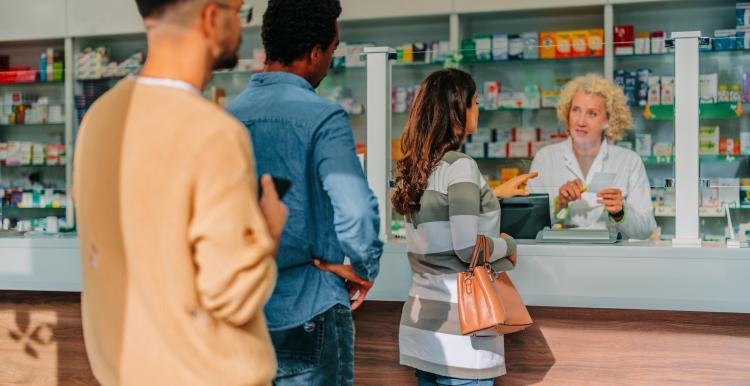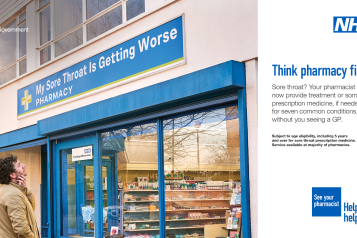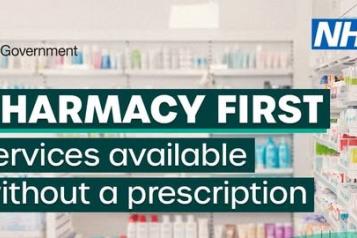Patients praise pharmacy services, but medicine shortages persist

Persistent problems accessing medications
Almost one in four respondents (23%) said they had been unable to get the medication they needed in the past 12 months because their pharmacy had run out—virtually unchanged from Healthwatch England’s research in December 2023 (24%).
Beyond supply shortages, nearly half (45%) reported experiencing an issue getting their medication. These included:
- Prescription delays: 19%, up from 12% in 2023.
- Prescription errors: 18%, up from 14%.
- Affordability concerns: 5%, up from 2%.
- Unexpected pharmacy closures: 9%, up from 7%.
- Permanent closures: 3%, up from 1%.
Awareness and privacy still hold some back
Launched in January 2024, Pharmacy First allows community pharmacists to diagnose and supply prescription-only medicines for seven common conditions without a GP appointment. Since then, 98% of pharmacies have signed up, delivering over two million consultations for the seven conditions.
Healthwatch England commissioned a representative poll of 7,029 adults in England, of which 3,104 (44%) people had visited their pharmacy for help with one of the conditions covered by Pharmacy First in the last year.
Nearly three in ten (29%) who said they were unlikely to use pharmacy for the seven conditions were not aware that pharmacies can provide treatment and advice for them.
The research identified other issues. While pharmacies are required to have private consultation areas, eight per cent of people said they felt uncomfortable discussing health concerns—often due to lack of space or being overheard by other customers.
The patient champion also analysed NHS data on Pharmacy First, stories shared by patients, and research by local Healthwatch services.
The analysis of NHS data on Pharmacy First consultations found striking variations in uptake across the nation; a pattern that was also reflected in the polling, with people in London more likely to visit their pharmacy for help with one of the common conditions (56%) than those in the East of England (35%).
Local Healthwatch teams also reported varying public awareness of Pharmacy First ranging from 39% in Halton to 72% in Stockton-on-Tees.
High public satisfaction with pharmacy services
Despite those challenges, an overall majority (86%) reported a positive experience of getting support for common conditions, citing convenience and speed as key benefits.
Over two in five respondents said they had used a pharmacy when they had one or more of the conditions covered by the scheme, with the most common conditions being sore throat (40%), urinary tract infection (28%), or earache (17%). This suggests that, whether or not they have a full consultation with a pharmacist, many are comfortable seeing a pharmacist instead of a GP.
The public wants pharmacists to do more
The research also reveals strong public appetite for expanding the scheme. Over three-quarters (76%) of people who said they were comfortable discussing their health with pharmacists support extending Pharmacy First. Over six in ten people said they would use a pharmacy for eye infections (67%), skin problems (66%) or management of high blood pressure or asthma (65%). Despite high satisfaction, Healthwatch England warns that barriers remain to expanding the role of pharmacists.
Debra’s story: "Without it, I can't eat properly"
Debra, 59, lives with diabetes and a digestive condition that requires a medication called Creon. She regularly struggles to get the correct dosage. "Without it, I can't eat properly, which in turn disrupts my diabetes control," she explains. "I've been told it's due to Brexit or customs, but whatever the reason, it's putting my health at risk."
Commenting on the findings, Louise Ansari, Chief Executive of Healthwatch England said:
"Pharmacy First is clearly delivering for patients—people value the speed, convenience, and expertise that community pharmacists offer and support getting help with more conditions. But to unlock its full potential, we must tackle the barriers holding some people back.
"Most concerning is the rise in problems people face in being able to access medications, a situation which is both frustrating and distressing for many patients.
"International supply issues will take time to resolve, but the NHS can act now to reduce the impact on patients. Providing clear guidance and giving pharmacists more flexibility to prescribe substitutes safely could make a real difference in people's lives.
"The NHS must also invest in improving privacy in pharmacies and ensuring everyone knows what support is available.
"With the right investment, Pharmacy First could play an even more vital role in easing pressure on GPs and improving access to care for millions."
We call for immediate action
The report, How is Pharmacy First Working for Patients?, shows the scheme is working well for many but to reach its full potential, key barriers must be addressed.
Healthwatch England is calling for:
- Clear public guidance on what to do if medication is unavailable.
- Greater flexibility for pharmacists to safely substitute medicines with patient consent.
- A national awareness campaign to boost understanding and update.
- Support for pharmacy teams, including funding and improved premises.
- Expansion of Pharmacy First to cover more conditions, based on public need.


